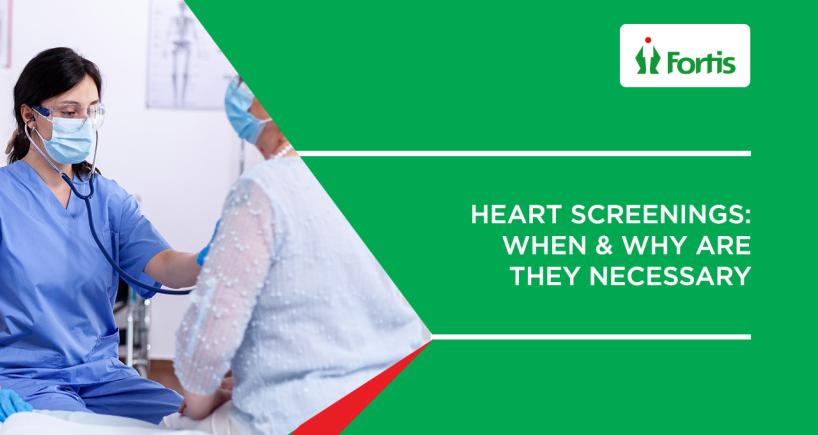
Heart Screenings: When & Why are they necessary
Strenuous work routines and demanding lifestyles prevent us from keeping a regular check on our heart health at times. One of the most simple and cost-effective ways of preventing heart diseases is understanding and managing the risk factors involved. For most of the population, this would mean scheduling an annual check-up with your doctor. Certain vital statistics of the human body can help determine if there are any required lifestyle changes or if any potential treatment is needed for existing heart conditions. While most heart health screenings begin later in life, certain screening tests should begin as early as age 20. These screenings are advantageous because your physician can let you know right away if you are developing any signs or symptoms of heart disease.
Fortis Hospital Kalyan has one of the best Cardiology departments in the city and has a variety of tests and screening facilities to detect any abnormalities of the heart. Our doctors recommend that cardiac screenings that are a part of comprehensive medical check-ups be done annually.
It is easy to ignore some commonly observed symptoms of heart diseases such as discomfort in the chest, slow or racing heartbeat, dizziness or fatigue, swelling in the feet, and shortness of breath. Informing your primary health care physician about the symptoms is necessary and can potentially be life-saving. Routine screenings are preventive healthcare measures and are even more necessary when there is a family history involved.
The cardiologists at Fortis Kalyan recommend getting some routine screening tests even if there is no history of heart disease in the family. Tests such as BP (blood pressure) and cholesterol should ideally start at the age of 20, and blood glucose monitoring tests should start by the age of 40 for most people. You might be encouraged to start the screenings at a younger age if you are predisposed to certain risk factors for heart diseases or if there is an existing strong family history.
What are some of the common heart screening tests that your doctor would recommend?
Electrocardiography (ECG)
This is one of the most common tests done using a machine and sensors that are attached to your chest. This machine will record the heart’s electrical activity and determine the heart rate and rhythm. This test is useful because it can show evidence of a previous heart attack or one that is in progress. The patterns on the ECG report are useful in pointing out the area of the heart that has been damaged as well as the extent of the damage.
Exercise cardiac stress test (Stress ECG)
More commonly known as a stress ECG, this test measures the heart’s ability to respond to external stress in a controlled clinical environment and is usually completed in around 15 minutes. This test can help detect coronary artery diseases and cardiovascular risks. The ECG will be recorded while you are exercising on a treadmill or stationary bike and will be traced at certain points to compare the effects of increasing stress on the heart.
Echocardiography
This test is performed by using an ultrasound machine that creates moving images of the heart. This can determine any problems with the pumping function of the heart and also evaluate the heart valves. An echocardiogram will provide information about blood clots in the heart chambers.
Cardiac CT scan
In this test, a CT scanner along with some electrodes attached to your chest will record the heart’s electrical activity. The CT scanner produces images of the heart and this can be used to evaluate the amount of plaque buildup in the coronary arteries.
Coronary CT Angiography (CTA)
This test is similar to a cardiac CT scan but involves the additional use of a contrast dye that is injected into the bloodstream which helps in visualizing the plaque buildup easily.
The cardiologists at Fortis Kalyan recommend some tips to maintain a healthy heart. A change in eating habits is the best way to keep heart diseases at bay. Controlling your portion size is extremely important as it can help shape up your diet and heart. Include more low-calorie and nutrient-rich foods and smaller amounts of high calorie and high sodium and processed refined fast foods. Unhealthy fats such as saturated and trans fats must be kept at a minimum level to reduce blood cholesterol and to lower the risk of coronary artery disease. Limiting the amount of salt in the diet is also an important part of a heart-healthy diet. Keeping your stress levels in check is the most important lifestyle change that can help keep your heart in a healthy condition for the future
Categories
Clear allMeet the doctor

- Cardiac Sciences | Interventional Cardiology
-
27 Years
-
1400



















